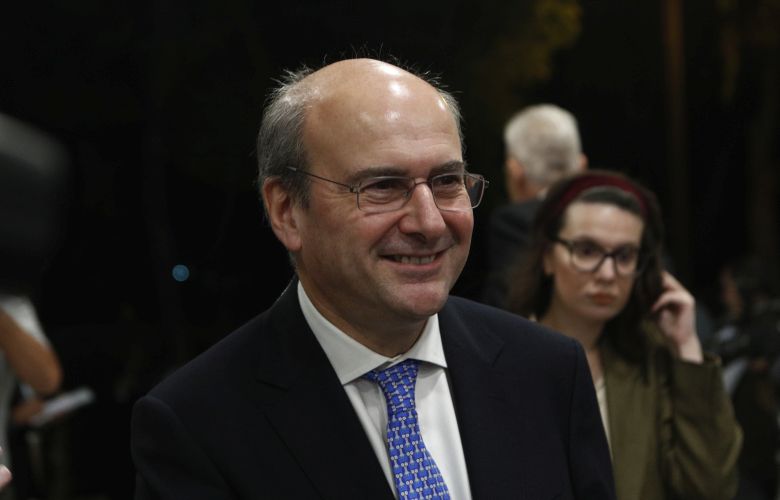“We are not complacent, we do not underestimate the economic and social problems, but it would be a big mistake to underestimate a collective national success in the fiscal and development field”
Greece is one of the 8 EU countries whose 2025 budget was approved without any reservations by the European Commission, as certified at the Eurogroup meeting in Brussels, in the presence of the Minister of National Economy and Finance, Kostis Hatzidakis.
On this matter, the minister stated: “One day before the start of the budget debate in the Plenary of the Parliament, the approval by the European Commission of the Greek budget without reservations certifies the credibility of our policy. But it is also a success for all Greeks. Of course, not all the wounds of the great crisis of the previous decade have been healed. And there are serious social problems to deal with. But it is particularly important for Greece, that we proceed with tax reductions, wage increases and spending increases on critical national and social priorities, while even large European countries are increasing taxes and proceeding with a policy of austerity in spending to cope with the new fiscal rules . We are not complacent, we do not underestimate the economic and social problems, but it would be a big mistake to underestimate a collective national success in the fiscal and development field.”
At the same time, at the Ecofin meeting, held today, the European Commission presented its assessment of the fiscal policies of the member states in the context of the application of new economic governance rules. Greece is one of the 20 countries for which the Commission recommends approval of the Medium-Term Plan and one of the 8 countries whose budget plans for 2025 are considered to be in full compliance with the fiscal recommendations and the upper spending limits.
In particular:
To date, 22 national medium-term plans have been submitted, of which 20 are considered to meet the requirements of the new framework and chart a credible fiscal path. Five Member States (Belgium, Bulgaria, Austria, Germany, Lithuania) have not yet submitted Medium-Term Plans.
17 draft budgets for 2025 have also been submitted by euro area member states (Austria, Belgium and Spain did not submit plans), of which eight are considered to be fully aligned with the fiscal recommendations, while seven are not are fully aligned, one is not aligned, and one may not be aligned.
In the framework of Ecofin, the ministers also discussed the revision of the Energy Taxation Directive, which is part of the environmentally ambitious legislative package “Fit for 55”. In the context of the negotiations, Greece has opposed the imposition of special taxation in the aviation and shipping sectors, as it considers that it creates serious risks for the competitiveness of tourism vis-à-vis third Mediterranean countries. And it counter-proposes the extension of the existing mandatory exemption with a review clause that will take into account the existence of alternative fuels in sufficient quantity and at affordable prices.
In his intervention, Mr. Hatzidakis emphasized the following: “We share the ambitious environmental goals set by the EU. And as a government we are implementing an ambitious program to promote the green transition (de-lignification, undersea electrical interconnection of islands, national reforestation program, etc.). However, the compared proposal will undermine the competitiveness of tourism due to the increased costs it will bring to air and sea transport, costs that will not be borne by the neighboring Mediterranean countries. Tourism has contributed very significantly in recent years to the recovery of the Greek economy and constitutes 1/5 of the GDP, while Greece has already imposed an environmental end to tourist activities in order to deal with the consequences of the climate crisis. Maintaining the existing exemption and extending the review clause could be discussed, in conjunction with the adequacy of alternative fuels.” The discussion on this topic will continue.
At the same time, in the context of Ecofin, the regular briefing of the ministers on the implementation of the Recovery and Resilience Fund took place, while the revised plans of Belgium, Denmark, Slovenia and Sweden were approved. Also, the president of the European Court of Auditors presented the Annual Report on the implementation of the EU budget for 2023.
During the Eurogroup conference yesterday, in an expanded composition (with the participation of all EU member states) in which the UK Finance Minister Rachel Reeves was also present, the discussion focused on international economic developments and the common challenges facing the EU and Great Britain.
In his intervention, Mr. Hatzidakis pointed out that increasing bilateral trade between the EU and the UK would bring mutual benefits, while stressing the need to coordinate efforts to promote free trade and mitigate the consequences of a US shift towards protectionism. In addition, the minister referred to the common challenges faced by the EU and the United Kingdom in terms of boosting investment and productivity. “Addressing these challenges requires action at three levels: First, fiscal policies that combine stability with growth and investment. Second, encouraging private investment through strengthening the efficient functioning of capital markets. Thirdly, central coordination to promote investments in areas of common interest, such as energy,” concluded Mr. Hatzidakis.
The finance ministers of the 20 eurozone member states then discussed the latest economic developments in the eurozone, based on the results of the International Monetary Fund’s mid-term review of the eurozone economy, which is expected to be completed in June 2025.








